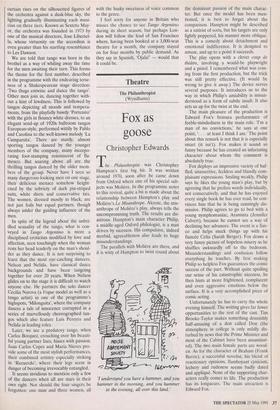Theatre
The Philanthropist (Wyndhams)
Fox as goose
Christopher Edwards
The Philanthropist was Christopher Hampton's first big hit. It was written around 1970, soon after he came down from Oxford where one of his special sub- jects was Moliere. In the programme notes to this revival, quite a bit is made about the relationship between Hampton's play and Mohere's Le Misanthrope. Alceste, the mis- anthrcipe of Moliere's play, always tells the uncompromising truth. The results are dis- astrous. Hampton's main character Philip, a middle-aged Oxford philologist, is a man driven by niceness. His compulsive, indeed morbid, agreeableness also leads to huge misunderstandings.
The parallels with Moliere are there, and it is witty of Hampton to twist round about 'I understand you have a hammer, and you hammer in the morning, and you hammer in the evening, all over this land.' the dominant passion of the main charac- ter. But once the model has been men- tioned, it is best to forget about the comparison. Hampton might be described as a satirist of sorts, but his targets are only lightly peppered, his manner more oblique. This is a comedy about detachment and emotional indifference. It is designed to amuse, and up to a point it succeeds.
The play opens with a clever coup de theatre, involving a would-be playwright and a pistol. I remembered what was com- ing from the first production, but the trick was still pretty effective. (It would be wrong to give it away.) The device serves several purposes. It introduces us to the way in which Philip's amiability is misun- derstood as a form of subtle insult. It also sets us up for the twist at the end.
The main pleasure of the production is Edward Fox's bravura performance of feeble-mindedness in the main role. 'I'm a man of no convictions,' he says at one point, . . at least I think I am.' The point about this remark is not that it is especially smart (it isn't). Fox makes it sound so funny because he has created an infuriating character about whom the comment is absolutely true.
Fox deploys an impressive variety of baf- fled, unassertive, feckless and blandly com- plaisant expressions. Smiling weakly, Philip says he likes the young man's play, but by agreeing that he prefers words individually, not consecutively, and that he has enjoyed every single book he has ever read, he con- vinces him that he is being cunningly dis- missive. Philip agrees to go to bed with a young nymphomaniac, Araminta (Jennifer Calvert), because he cannot see a way of declining her advances. The event is a fias- co and helps muck things up with his fiancée Celia (Sarah Berger). Fox draws a very funny picture of hopeless misery as he shuffles awkwardly off to the bedroom. Misunderstandings and confusion follow everything he touches. By first making Philip so helpless Fox guarantees the comic success of the part. Without quite spoiling our sense of his catastrophic niceness, he then hints at more frightened, complacent and even aggressive emotions below the surface. It is a very accomplished piece of comic acting.
Unfortunately he has to carry the whole evening himself. The writing gives far fewer opportunities to the rest of the cast. Tim Brooke-Taylor makes something donnishly half-amusing of a don called Don (the atmosphere in college is only mildly dis- turbed by news that the Prime Minister and most of the Cabinet have been assassinat- ed). The two main female parts are wood- en. As for the character of Braham (Frank Barrie), a successful novelist, his blend of reactionary opinions, flamboyant cynicism, lechery and rudeness seems badly dated and appliqué. None of the supporting char- acters really comes to life. The production has its longueurs. The main attraction is Edward Fox.


















































 Previous page
Previous page